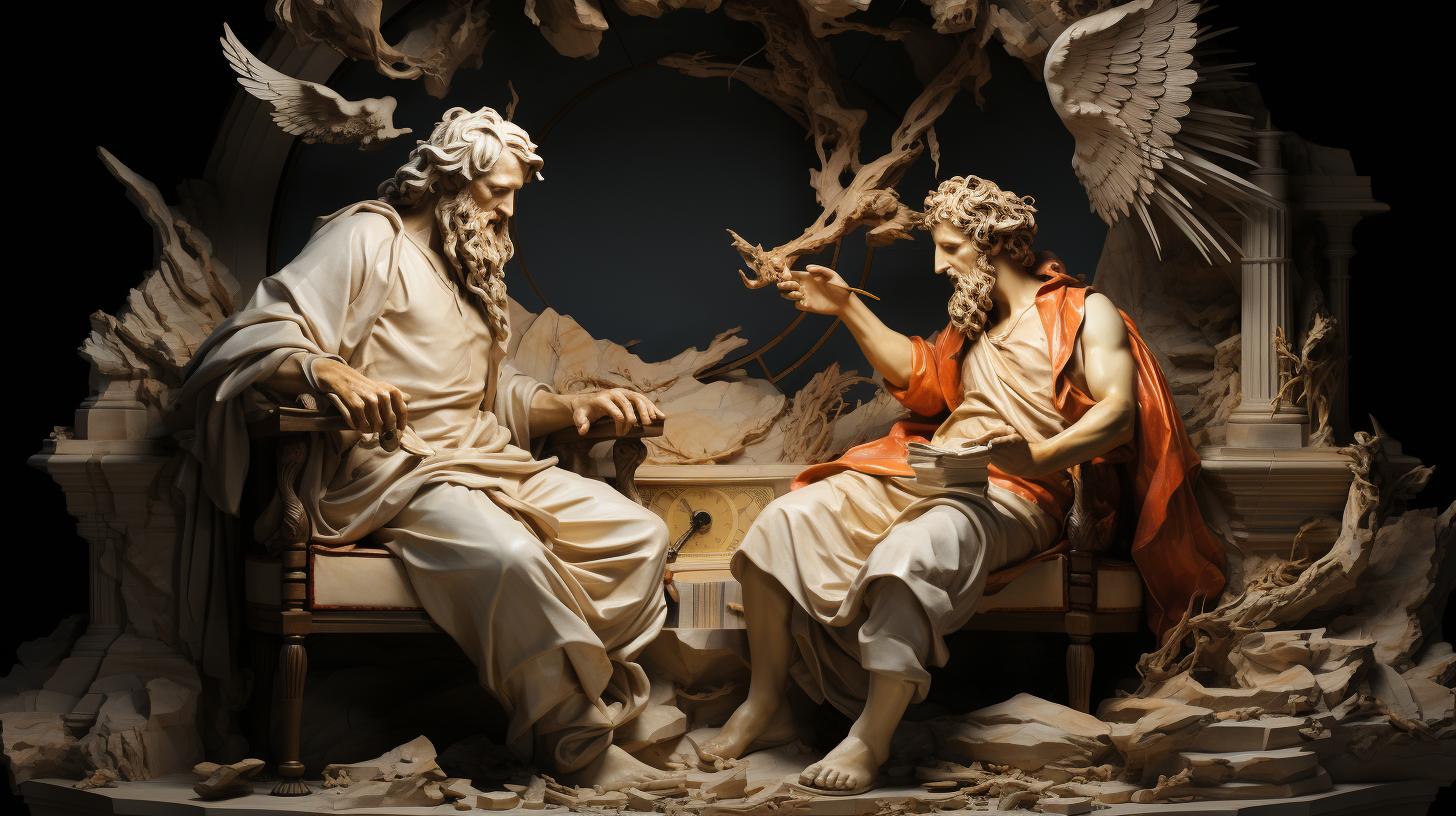Why Did Icarus Tempt Fate? The Daedalus and Icarus Myth Explained

The myth of Daedalus and Icarus explores the tragic consequences of unchecked ambition. Daedalus, a skilled craftsman, builds wings out of feathers and wax to escape King Minos’ labyrinth.
With a warning about flying too close to the sun, Icarus takes flight, but his wings melt, leading to a fatal fall into the sea. Symbolizing the dangers of overconfidence, this ancient tale holds valuable lessons.
From its cultural significance to modern interpretations, this article examines why Icarus flew too close to the sun and what we can learn from this cautionary myth.
The Origins of Daedalus and Icarus
The story of Daedalus and Icarus is an ancient myth of Greek origin, steeped in fascinating legends and timeless tales.
It begins with Daedalus, a brilliant craftsman and architect, and his son Icarus, who embarked on an extraordinary journey that would forever be remembered.
Daedalus and the Labyrinth of King Minos
Daedalus found himself entangled in the treacherous web of King Minos’ Labyrinth, a sprawling maze designed to house the terrifying Minotaur.
With his exceptional intellect and cunning, Daedalus managed to construct this intricate labyrinth, ensuring its complexity would confound all who dared to enter.
The Creation of Wings and the Plan to Escape
Desperate to escape the clutches of King Minos, Daedalus devised an audacious plan.
He crafted wings using feathers and wax, ingenious to enable flight. With careful precision, he attached these wings to his own back and to his son Icarus, envisioning their triumphant flight to freedom.
Inspired by his father’s passion for exploration and adventure, Icarus eagerly embraced the chance to soar through the skies. Little did he know of the danger that awaited him when he reached for the sun.
Icarus Takes Flight
Icarus, filled with excitement and anticipation, prepares to embark on a daring journey to freedom, defying the constraints of the earthly realm. However, before his departure, Daedalus, his father and mastermind behind the plan, issues a solemn warning to Icarus.
The Warning from Daedalus
Daedalus, ever mindful of the risks involved, cautions Icarus against the perils of soaring too close to the sun. He elucidates the dangers of the scorching heat, emphasizing the potential calamity that awaits those who compromise the integrity of their wings made of feathers and wax.
With an earnest voice and paternal concern, Daedalus implores Icarus to exercise prudence and to maintain a moderate altitude during their flight.
The Journey towards the Sun
Despite Daedalus’ earnest warning, Icarus finds himself captivated by the allure of the celestial sphere. As he takes flight, a sense of invincibility engulfs him, leading him to soar ever higher towards the mesmerizing brilliance of the sun.
The thrill of defying the laws of nature fuels his audacity, blinding him to the impending peril that naively awaits him.
Entranced by the radiant warmth and the ethereal vista that unfolds before him, Icarus becomes increasingly oblivious to his father’s advice.
Driven by hubris and an insatiable desire to explore uncharted territories, he ventures closer and closer to the resplendent orb, disregarding the consequences that are about to unfold.
With each passing moment, the intense heat of the sun mercilessly begins to weaken the delicate sinews of Icarus’ wings.
Gradually, the wax binding the feathers deteriorates, leaving him vulnerable to the unforgiving forces of nature. Ignorant of the imminent catastrophe looming overhead, Icarus’s wings ultimately succumb to the heat, disintegrating in a hauntingly beautiful spectacle akin to a fallen star.
The effects of Icarus’ ill-fated decision become devastatingly apparent as he plummets precipitously towards the cerulean expanse below. The once exuberant flight turns into a heart-wrenching tragedy, serving as a poignant reminder of the consequences of unchecked ambition and arrogance.
The Downfall of Icarus
The tragic end to Icarus’ flight is marked by two key events that sealed his fate. These events, depicted in ancient Greek mythology, offer timeless lessons about the consequences of hubris and disobedience.
Let’s explore them in detail:
The Melting of Icarus’ Wings
As Icarus soared through the sky, basking in the exhilaration of flight, the wax used to secure his feathered wings started to gradually soften. Ignoring his father’s warning, Icarus flew higher and higher, drawn towards the brilliance of the sun.
The intense heat caused the wax to melt, causing his once sturdy wings to weaken and falter.
The significance of the melting of Icarus’ wings is a stark reminder of the dangers of unchecked ambition.
It symbolizes the perils of exceeding one’s limitations and the dire consequences of succumbing to the allure of the unattainable.
The Tragic Fall into the Icarian Sea
As Icarus’ wings disintegrated, he plummeted towards the sea below. The great height he had reached amplified the force of his fall, sealing his tragic fate. The location where he met his untimely end came to be known as the Icarian Sea, forever memorializing this ill-fated flight.
Icarus’ fall serves as a cautionary tale about the importance of listening to wise counsel and acknowledging one’s limitations. It reminds us that defying warnings and pursuing reckless ambitions can ultimately lead to our own downfall.
The downfall of Icarus encompasses these pivotal moments, highlighting the consequences of reckless behavior and the devastating outcomes that follow. It serves as a timeless reminder of the dangers of hubris and the importance of embracing humility.
Analysis of the Myth
The myth of Daedalus and Icarus holds significant symbolism and important lessons. This section delves into the analysis of the myth, exploring the symbolism behind the use of wax and feathers and the lessons that can be learned from Icarus’ tragic tale.
Symbolism of Wax and Feathers
The choice of materials used to construct the wings in the myth holds symbolic meaning. The wax represents fragility and imprudence, as it is susceptible to heat and melting. It symbolizes the danger of allowing one’s desires and ambitions to override rationality and caution.
On the other hand, feathers symbolize aspirations, freedom, and the pursuit of lofty goals. They represent the human desire to reach new heights and explore uncharted territories.
Lessons Learned from the Myth
The myth of Icarus flying too close to the sun imparts valuable lessons that resonate across generations:
- The importance of heeding warnings: Icarus’ downfall stems from ignoring the warning given by his father, Daedalus.
This reminds us of the significance of listening to advice and considering the repercussions before embarking on risky endeavors.
- The perils of unchecked ambition: Icarus’ excessive ambition leads to his tragic end.
The myth serves as a cautionary tale, highlighting the dangers of pursuing goals without tempering ambition with practicality and moderation.
- Understanding limitations: Icarus’ failure to understand the limitations of his wings and the consequences of flying too close to the sun serves as a reminder of the importance of recognizing and respecting our own limitations in the pursuit of success.
- Balancing freedom and restraint: The myth underscores the delicate balance between freedom and restraint.
While the desire for freedom and exploration is natural, it must be tempered with wisdom and caution to avoid adverse consequences.
- Accepting consequences: Icarus’ story highlights the consequences of hubris and the importance of accepting responsibility for our actions.
It reinforces the notion that actions have consequences, and disregarding them can have severe outcomes.
By analyzing the symbolism and drawing lessons from the myth of Daedalus and Icarus, we gain insights into the dangers of unchecked ambition, the importance of heeding warnings, and the need for balance in our pursuit of dreams.
Cultural Significance and Moral Themes
The myth of Daedalus and Icarus holds significant cultural significance and provides valuable moral teachings that have been explored and represented in various forms of art, literature, and other creative outlets.
From paintings to sculptures, and from poems to novels, the story’s themes of hubris, ambition, and the consequences of unchecked pride have resonated through the ages.
Icarus in Art and Literature
The tragic tale of Icarus has been a popular subject for artists and writers throughout history.
Paintings such as “The Fall of Icarus” by Pieter Bruegel and “Landscape with the Fall of Icarus” by William Carlos Williams have captured the final moments of Icarus’ flight, highlighting the folly of his actions.
Similarly, literary works like W.H. Auden’s poem “Musée des Beaux Arts” and James Joyce’s novel “A Portrait of the Artist as a Young Man” have incorporated Icarus as a metaphor for the human desire to surpass limitations.
The Moral of ‘Flying too Close to the Sun’
At its core, the moral lesson of ‘flying too close to the sun’ reminds us of the dangers of excessive ambition and the importance of humility. It urges individuals to consider the boundaries of their abilities and the potential consequences of pushing beyond them.
By exploring the story of Icarus in various media, artists and writers have sought to reinforce this moral, encouraging viewers and readers to reflect on their own aspirations and the risks they may entail.
- The myth teaches us the importance of listening to wise advice and heeding warnings.
- It warns against the perils of arrogance and overconfidence, stressing the need for humility.
- It emphasizes the balance between ambition and acknowledging one’s limitations.
- The story serves as a cautionary tale, reminding us that actions have consequences.
By exploring and analyzing the cultural significance and moral themes surrounding the myth of Daedalus and Icarus, we gain a deeper understanding of the human condition and the timeless lessons embedded in ancient storytelling.
Modern Interpretations and Adaptations
Icarus in Film and Popular Culture
In recent years, the myth of Icarus and his ill-fated flight has captivated the imagination of filmmakers and artists. Numerous films and TV shows have incorporated elements of the myth, exploring themes of ambition, hubris, and the consequences of disregarding warnings.
These portrayals often showcase stunning visual effects to depict Icarus soaring through the skies or his tragic fall. Some notable examples include the films “Icarus Rising” and “Wings of Fate,” which provide modern interpretations of the ancient myth.
Through these adaptations, filmmakers aim to convey the timeless message of the perils of overconfidence.
Contemporary Relevance and Lessons for Today
The story of Icarus continues to resonate in contemporary society, serving as a cautionary tale against recklessness and unchecked ambition. In a world driven by technological advancements and the pursuit of new heights, the myth reminds us of the importance of balance and humility.
It warns against pushing boundaries without considering the consequences. Icarus’ desire for freedom and his defiance of limitations mirror our own aspirations, highlighting the need to approach our dreams with a sense of caution and awareness.
By reflecting on Icarus’ downfall, we can gain insights into our own lives and the importance of heeding wise advice.
Key Takeaways:
- Modern films and TV shows have embraced the myth of Icarus, offering fresh interpretations and visuals that capture its timeless essence.
- The myth of Icarus acts as a reminder to maintain a balance between ambition and caution in a rapidly evolving world.
- By learning from Icarus’ mistakes, we can navigate our own aspirations with wisdom and humility, avoiding the tragic consequences of overconfidence.
Exploring Similar Myths and Folklore
Delving into the realm of mythology and folklore reveals that the story of Icarus flying too close to the sun is not an isolated incident of hubris leading to a tragic downfall.
Other mythological figures across various cultures have also fallen victim to their own pride and ambition.
Other Mythological Figures with Hubris
In Greek mythology, the character of Phaethon serves as a striking parallel to the story of Icarus. Phaethon, driven by his desire to prove his divine heritage as the son of the sun god Helios, convinces his father to let him drive the sun chariot across the sky.
However, unable to control the fiery steeds, Phaethon veers dangerously close to the earth, scorching the lands and causing widespread destruction. Zeus, the king of gods, strikes him down with a thunderbolt to prevent further catastrophe, highlighting the consequences of hubris.
- The Greek myth of Arachne also offers insights into the dangers of pride. Arachne, a talented mortal weaver, challenges the goddess Athena to a weaving contest. Despite producing masterful tapestries, Arachne’s boastfulness and lack of respect for the gods lead to her transformation into a spider, forever weaving intricate webs as a reminder of her arrogance.
- In Norse mythology, the tale of Loki, the mischievous trickster god, showcases how arrogance and hubris can bring about downfall.
Loki’s cunning and quick wit often lead him to overestimate his abilities and underestimate the consequences. He orchestrates the death of the beloved god Baldr, sparking the chain of events that result in his own imprisonment and punishment.
Cross-Cultural Tales of Overambition
Beyond the realm of Greek and Norse mythology, cross-cultural folklore further reinforces the timeless theme of overambition and its consequences.
- In Egyptian mythology, the story of Ra and the serpent Apep reveals the dangers of disrespecting and challenging the gods. Ra, the sun god, navigates the underworld daily, battling against Apep, representing chaos and evil.
The serpent becomes an archenemy to Ra, symbolizing the chaos that can arise when individuals push their boundaries against the greater forces governing the universe.
- In Indian mythology, the tale of Ravana, the demon king, illustrates the seductive nature of power and unchecked ambition.
Ravana, believing himself invincible, kidnaps Sita, the wife of Lord Rama, leading to his ultimate downfall and defeat at the hands of the divine forces aligned against him.
These diverse mythological and folkloric examples demonstrate the universality of the themes present in the story of Icarus.
Regardless of culture or time period, the repercussions of overambition and defiance of higher powers serve as cautionary reminders for individuals seeking to ascend beyond their rightful limits.
.




















